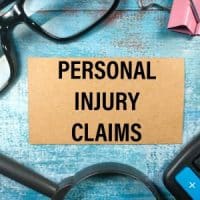How Does A Criminal Conviction Affect A Personal Injury Claim?

Personal injury cases typically involve negligent conduct. For instance, if someone runs a red light and hits another car, that driver is negligent. They can be cited for violating traffic laws and may face a potential civil lawsuit from the people in the other car.
This is a simple illustration of how California law separates civil and criminal liability. These are distinct parts of our legal system that have different rules and requirements for proving a case. And in fact, each can proceed independently of one another.
The Difference Between Proving a Civil and Criminal Case in California
Let’s consider a hypothetical case where instead of a driver simply running a red light and causing an accident, they were also intoxicated at the time of the crash. Everyone knows that drunk driving (DUI) is a criminal offense in California. Indeed, if someone sustains a serious injury in a DUI-related crash, the drunk driver can be charged with a felony in California.
But suppose the prosecution elects not to bring a felony charge or a jury finds the defendant not guilty. Does that mean the injured accident victim is barred from bringing a separate personal injury claim? Not at all. As we said, the civil and criminal legal systems operate independently of one another in this context. So the victim could still pursue a successful personal injury lawsuit.
The main reason for this is that the civil and criminal legal systems have different burdens of proof. In a criminal trial, a prosecutor must prove that a defendant is guilty “beyond a reasonable doubt.” This standard applies to every element of the charged offense. So if even a small part of the prosecutor’s case is not solid, the jury may be forced to acquit a defendant.
With a civil personal injury case, in contrast, the burden of proof is a “preponderance of the evidence.” This is significantly lower than “beyond a reasonable doubt.” In simple terms, a personal injury victim need only show it was more likely than not that the defendant’s actions caused their injuries. And again, the plaintiff does not have to prove the defendant committed a crime, only that they acted negligently or recklessly.
Do You Have a Possible Wrongful Death Case?”
The civil-versus-criminal distinction often comes up when discussing wrongful death cases. In California, the surviving spouse, children, and other heirs of a deceased individual may sue a negligent party for causing the wrongful death of their loved one. A wrongful death in this context can include someone who died as the result of a potentially criminal act, such as murder. Again, even if the defendant is never charged or convicted of murder or manslaughter, they can still be held accountable in a civil wrongful death case. In some cases, a wrongful death claim may be the only way for a family to obtain some measure of justice.
So if you have been injured or lost a loved one due to someone else’s reckless or illegal actions and you need to speak with an experienced Monterey personal injury attorney, contact the Allen Law Firm today to schedule a free initial consultation.

